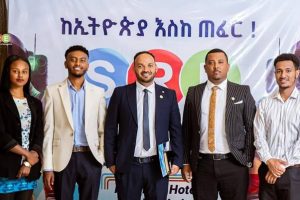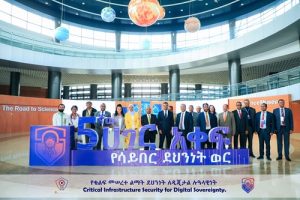BY HAFTU GEBREGZIABIHER
The Ministry of Education has recently signed a memorandum of understanding (MoU) with Kilimanjaro Privately Limited Company and Education for Ethiopia Foundation, which will enable them to work together on science, technology, engineering and mathematics centers in universities.
The agreement has been signed by the State Minister of Education Samuel Kifle (Ph.D) and the representatives of the two organizations.
It is stated during the signing ceremony that the agreement aims to increase the youth’s entrepreneurship skills, find resources, provide capacity building training, and do scientific work together.
“The agreement made will help to strengthen the knowledge, skills and creativity of young students.”
According to the information obtained by the Ministry of Education, the ministry is organizing about 38 science, technology, environmental and mathematics centers in universities to increase the entrepreneurship skills of the youth.
Science, technology and mathematics (STM) are critical to and supportive of the quality of education being offered today, from the adoption of common internationally benchmarked standards (international student assessment surveys) to better teacher preparation and enhanced coordination across the entire education system. In fact, STM is a focus area for the Ethiopian Government for the national education system and a manifestation of the country’s overall development endeavor.
The government stresses a multidisciplinary approach for better preparing students in STM subjects and increasing the quantity and quality of post-secondary graduates prepared for STM occupations. The Ethiopian Government’s motivation for this new emphasis on STM education (STME) is justified for a number of reasons. Increasing the number of students versed in STM and promoting sufficient and qualified graduates ready to pursue STM careers or advanced studies is critical to the country’s rapidly growing economy.
A labor force that is not equipped with the right skills in STM fields cannot accommodate the current demand for such skills, and will fail to meet the needs of Ethiopia’s (potentially) increasing manufacturing industry and construction market. Therefore, politicians, education leaders and policymakers at all levels have called for a new emphasis on STME in the nation’s schools, from primary school through to postsecondary education. STME is a means of developing a citizenry capable of scientific thinking and logical reasoning, in order to form cohesive social integration across all fields of the endeavor of nation building. Sufficient literacy and numeracy, as well as the process skills of science backed up with proper technological knowledge, are expected to help scale up the level of thinking and build up a literate citizenry who will be committed to nation building and national development.
In this respect, there is a strong consensus among key actors that the country needs to have a national strategic policy for STME, which is a means for achieving these ambitious goals. This background document for a national strategic policy for STME has been developed for this reason, looking at pre-school through tertiary levels of education. This strategic policy foundational study provided support for the strategic policy to directly link and contribute to the objectives stated in the past education policies. It can be further adopted in the form of a strategy and action plan at the regional and zonal levels. It guides the education sector on how to develop the human resources required to achieve the national objectives of leading the country’s rapid and demanding economic growth trajectory, pointed out at the national strategic policy developed by the Japan International Cooperation Agency (JICA).
The research article titled; Mathematics education in Ethiopia in the era of COVID-19: Boosting equitable access for all learners via opportunity to learning, the Federal Democratic Republic of Ethiopia has been implementing new curricula since 2021/22 academic year. This might be an opportunity for educators and researchers to forward inputs to the decision making bodies. In this article, the construct “opportunity to learning” (OTL) is taken as a parameter for addressing one of the goals of education, equitable access in mathematics education. This was done by adopting two frameworks. Finally, the findings come up with ten discussion points in order to boost the equitable access for all learners. The work may serve as a position paper to inform curriculum implementers and educational material producers in countries like Ethiopia.
As COVID-19 pandemic continues to challenge societies, and as countries implement measures such as ‘social distancing’ and full/partial school closure, decide makers on education need support from researchers in the field. If large scale vaccine development and intervention is a distance matter for countries, the challenge posed by this pandemic can be changed to opportunity in many aspects: parental engagement increase, advancing remote learning (online learning), budget increment (priority) and training new teachers in the education systems.
Furthermore, the paper argues that it is an opportunity for subject specialists educators like mathematics educators/researchers participation. In this article, the construct “opportunity to learning” (OTL) is taken as a parameter for addressing one goal of education: equitable access in mathematics education.
Prioritize teaching and learning of mathematics is found an important measure, as to the paper. As mathematics is a difficult subject for many learners, it is vital to prioritize creating OTL for learners. That means time utility for critical conceptual understanding is vital. Apply time multiplexing: divide the number of students in a classroom (some students come in some of the periods and other in the rest). Use 6 days in a week and half of the students can come 3 days in a week and others can come on the other 3 days.
Provide tasks that promote higher OTL for learners. Curriculum developers, text writers, subject specialists, and researchers should provide supplemental materials organized by tasks that promote critical thinking, reasoning, problem solving and modeling are preferable than those meaningless repetitive tasks.
As part of mathematical discourse, talk is one of the elements of OTL for learners. Evidence of student thinking and learning can be visible when learners begin to talk about their conceptual and procedural understanding. As “social distancing” is enforced, it can be easy to isolate learners. Hence, a deliberate plan is needed for nurturing talk by using existing structures.
The other important thing here is that teachers are key means to students’ learning. The quality of mathematics teacher training can improve student learning. MKT is one construct researchers are engaged in equipping teachers to boost the quality of OTL.
Focusing on important learning goals at a grade level as a means to boost OTL for all learners, spending appropriate time on essential learning goals that are suitable in the learning progression would allow teachers, parents and leaders to be pragmatic.
COVID-19 era school disruption demands education systems to support schools with extra on-line activities, connectivity, television and radio instruction. Going to digital demands an extra budget and policy making. For that, mathematics educators and teachers should advocate for it.
The other issue is that advocating on assessment. Teachers are expected to be equipped well: to plan their instruction based on the data collected, to do assessment for learning and assessment of learning. So, assessment might be conducted flexibly, for instance, by waiving, eliminating or postponing some national or local summative assessments and focusing or embedding formative assessment in the instruction.
Effective education system in the 21st century should have a dynamic, ongoing, embedded at job, content focused professional learning. In addition, professionals should collaborate and cooperate for best practices. If the cascade model of professional development is not working for the country, it has to be replaced by other models that can fit to the context of teachers in the country. 10. Applying the principle of the “minimum barrel”.
THE ETHIOPIAN HERALD FRIDAY 5 AUGUST 2022





